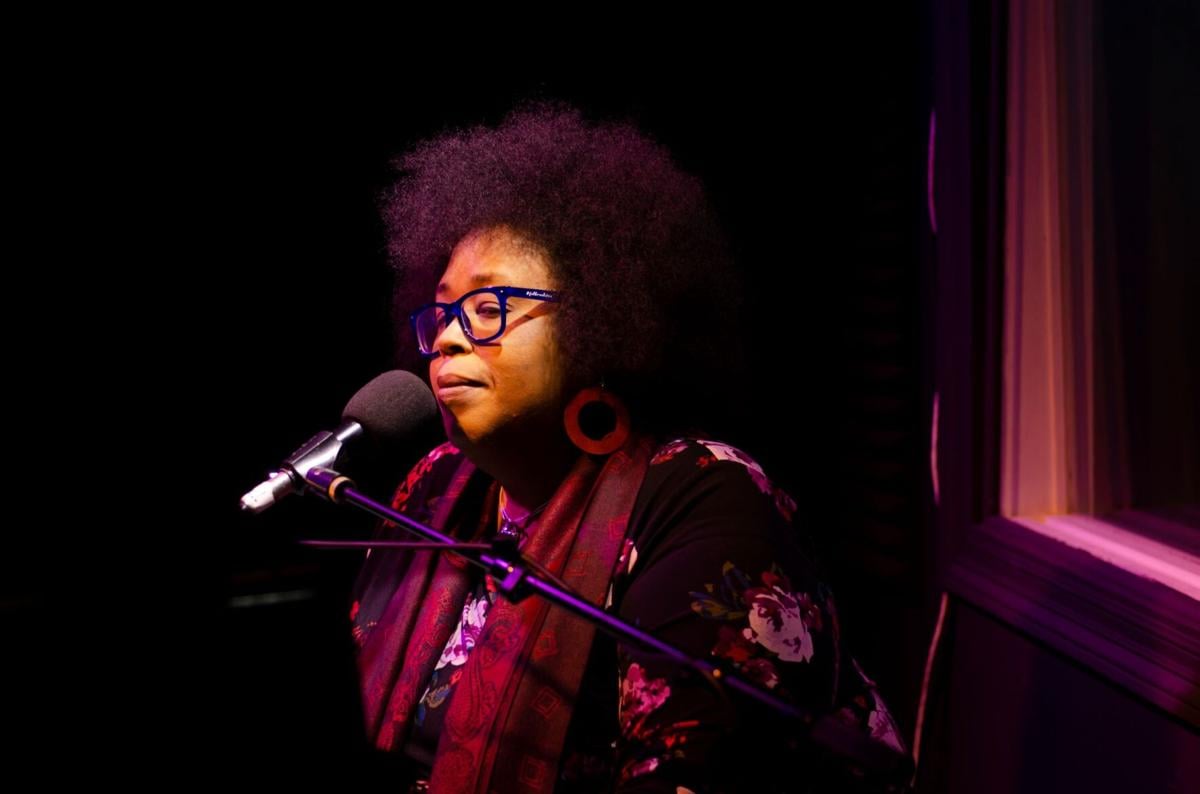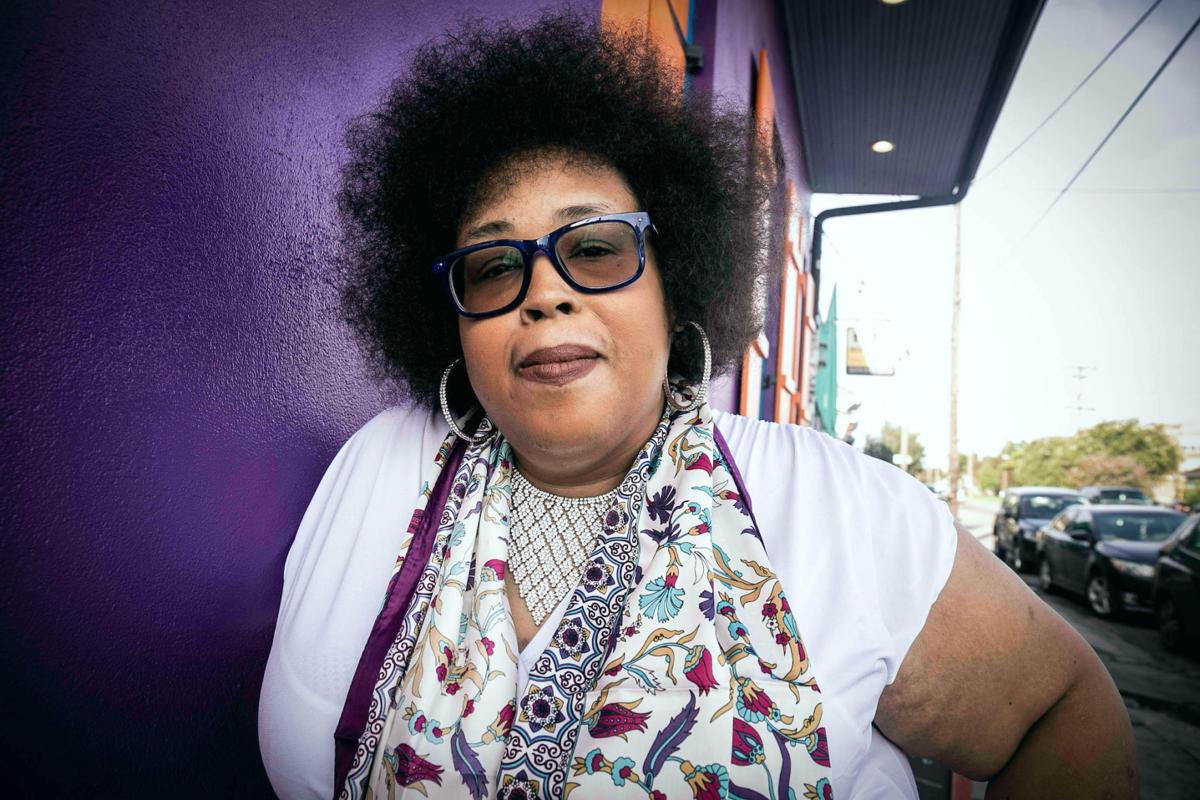Lilli Lewis, record label exec and recording artist, finds her voice in ‘My American Heart’

New Orleans-based singer-songwriter Lilli Lewis.

New Orleans-based singer-songwriter Lilli Lewis.
- PHOTO BY LIV PISCDALO-JONES
As a Louisiana Red Hot Records vice president, Lilli Lewis is charged with finding and developing talent.
Sometimes, she doesn’t have to look very far.
Lewis herself is a talented singer and songwriter. Trained as an opera singer and classical pianist, she draws on soul, folk, jazz and other sources to distill her own powerful brand of Americana music.
In January, Louisiana Red Hot Records released the Lilli Lewis Project’s “My American Heart: Red + Blue,” a synthesis of two separate EPs she first released late last year.
Lewis intended the EPs to be audio sketchbooks for a full-length album due later this year. But the material, especially combined in the “Red + Blue” package, feels fully fleshed out, from the arrangements to the musicianship to Lewis’ potent voice and lyrical convictions.
On Friday at 3 p.m., Lewis is the featured artist for the New Orleans Jazz Museum at the Old U.S. Mint’s “Piano Hour” virtual concert. Performing solo, she’ll showcase songs, in stripped-down form, from throughout her ever-growing repertoire. It is free to watch at facebook.com/nolajazzmuseum/live.

PROVIDED PHOTO
Lewis doesn’t yet need to choose between working behind the scenes at a record label or onstage as an artist. But that day may come.
When it does, it will be the culmination of a long, personal and professional journey. Lewis has not always felt comfortable in the larger Americana music community, which is overwhelmingly White and tends to emphasize country- and folk-derived styles. Soul and R&B, more traditionally Black music forms, are not as prevalent.
“I’ve been told outright, ‘I was afraid you’d be too ethnic for my venue,’ ” she said. “’What do you play? We don’t like hip-hop here.’ I was like, ‘We have a bluegrass set.’
“Because I’ve gotten that feedback, I’ve been hyper-aware of my crowd and aware of what they can take. I always try to push them a little further.”
Lewis grew up in Athens, Georgia, the daughter of a “hardcore introvert” Baptist preacher who earned a theology degree from Princeton and felt more at home amongst Presbyterians. “He never really quite fit in,” Lewis said. “I inherited that out-of-place-ness from him. I’m a miniature version of him, without the theology degree.”
After boarding school in Connecticut, she attended the University of Georgia on a piano scholarship. While running an open mic series at a coffeeshop in Decatur, Georgia, she met musician Liz Hogan, a student at nearby Agnes Scott College. The two bonded during a drive to a women’s music festival. They became a couple and eventually got married.
They spent 18 months working at a Buddhist retreat center in Colorado before moving to Hammond, Hogan’s hometown. Living in small-town Louisiana introduced Lewis to a different community.
“Being queer and Black and a little bit nerdy, the people around you will be progressive,” she said. “But living with people who see the world completely differently grew me up quite a bit. I experienced bigotry, but also a whole lot of decency. That people could hold both together was a big lesson for me.”
In 2009, Lewis and Hogan co-founded folk-rock band the Shiz. The Shiz went on to release several recordings of self-described “conscious, hippie, lesbeaux folk rock and soul.” On the road, Lewis was sometimes mistaken for Brittany Howard, of Alabama Shakes.
“We were completely indie, making it up as we went along,” Lewis said. “Very song-driven. It was a fun band.”
The couple moved to New Orleans after Hogan enrolled in the creative writing workshop at the University of New Orleans. They performed at the Neutral Ground Coffeehouse and elsewhere. The city was a revelation. “How come it took me so long to get here?” Lewis said. “The city put me to work as soon as I landed.”
Sousaphonist Kirk Joseph hired her for his band, an ongoing educational experience in itself. “Funk is something I’m terrible at,” Lewis said. “Kirk was so patient with me.”
The Shiz ran out of steam after Hogan took a teaching job at UNO and shifted her focus to writing poetry instead of songs.
In 2015, Lewis went to work at Louisiana Red Hot Records. Her job grew more demanding as the company’s founder, Harris Rea, battled leukemia. She had neither the time nor the desire to sing. “But that wasn’t sustainable. My soul was getting sick.”
So she launched the Lilli Lewis Project with drummer Wade Hymel, a holdover from the Shiz. The Lilli Lewis Project’s first public performance was on April 14, 2016, its namesake’s birthday.
“That was me trying to give my voice back to myself. It was complete vanity, but in an earnest way.”
During a residency at the Banks Street Bar and at other gigs, their philosophy was to “practice radical decency. For a time, we had 10 members. It was more of a tribe than a band.”
In contrast to the upbeat, folk-minded rave-ups favored by the Shiz, the Lilli Lewis Project drew on more restrained jazz, soul and R&B.
“I still came from a very indie point of view, even when I was playing more jazz material,” Lewis said. “There was a level of maturation to give ourselves to these songs instead of the sweaty, revivalist songs we used to do. These songs require holding back and empty spaces.”
She drew inspiration from Rea, who maintained his enthusiasm and positive attitude even as he traveled to Houston for treatment at MD Anderson Cancer Center (he died there in 2017).
“He seemed to not know how to quit,” Lewis said. “That was transformative for me. I’m taking that energy and giving it to what I know I was born to do.”
At some point, she decided to quit her job at Louisiana Red Hot Records. “I can’t do this at the expense of my music anymore,” she told Rea’s wife, Carmen Sunda, who was running the company.
To keep Lewis onboard, Sunda offered to sign her as an artist. So Lewis stayed on and eventually became a vice president and head of A&R, working on projects by singer Erica Falls, zydeco bandleader Dwayne Dopsie and bassist Roland Guerin, among others.
“I’m stacking the roster with people who are being creative and doing extraordinary things but have a hard time finding a home. They’re in the same boat I’m in — not exactly book-able in New Orleans.”
She started sketching out the “My American Heart” material last spring. She awoke with the title track fully formed early one morning in May, just before George Floyd died at the hands of Minneapolis police. Floyd’s death and the protests that followed caused Lewis to “push the fast-forward button. We were in a moment when I felt more free to say things I wouldn’t normally say.”
For her, songwriting was “diary work. The songs were just explaining what was going on in my head.”
Lyrics are based directly on her experience of being “different.” “I was always the Black kid in a class with White kids, the poor kid in a class of rich kids. I was always the counterpoint to the norm in any given space. That meant I got access to people in a very relatable way. These songs are all real stories from that being my walk.”
Working with veteran producer Mark Bingham, she recorded at multiple sessions in the summer and fall, backed by a core rhythm section of Hymel on drums and acoustic guitar and Kenny Murphy on bass. Bassist Jimbo Walsh, lap steel guitarist Dave Easley, fiddle player Gina Forsyth and keyboardist Josh Paxton all contributed.
The material was more vulnerable, more personal, more open, more American.
“Sometimes you feel foolish and ridiculous for holding your heart open,” Lewis said. “It aches sometimes. But that’s where hope lives.”

